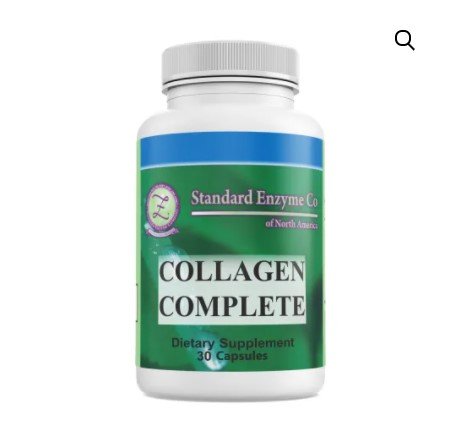What can you do about Collagen loss?

Collagen
What is it? How can you improve it?
Collagen is the most abundant protein in the body, and is responsible for healthy joints and skin elasticity. Collagen is found in blood vessels, bones, intestinal lining, ligaments, muscles, organs, skin, tendons, and other connective tissues. Without an adequate supply of collagen, the body will experience increased signs of aging. This can include aching joints, brittle hair and nails, muscle weakness, sagging skin, weak bones, and wrinkling.
As a person ages, collagen production naturally decreases. But aging isn’t the only reason people lose collagen. Poor diet and the presence of toxins that interfere with glycine production can seriously hamper the body’s production of this vital protein. Glycine is an amino acid that is critical to the formation of collagen in the body. (1, 2)
How Glyphosate Breaks Down Collagen
Glyphosate is a pesticide whose wide use makes it difficult to avoid. Not only is the poison sprayed on crops and sports fields all over the country, but people spray it on their lawns as well. Glyphosate interrupts the shikimate pathway, severely damaging the integrity of crops.
The shikimate pathway, responsible for producing amino acids and vitamins, is the building block of plant cells. Once glyphosate disrupts this pathway, it compromises the crop. When someone eats glyphosate-sprayed crops, the toxin enters the body and damages and degrades the collagen matrix. Glyphosate can replace the amino acid glycine in the structure of collagen, making the resulting complex ineffective. When that occurs, collagen becomes less structurally sound, which can lead to more frequent injury. (3, 4)
Collagen, Glyphosate, and Osteoarthritis
It is becoming well known around the world that glyphosate can cause considerable damage to the body. Part of that damage is the breakdown of collagen, which can lead to osteoarthritis. (5)
25% of the body contains collagen.
25% of the amino acids in collagen are glycines.
Glyphosate will step in glycine’s role, disrupt the collagen matrix, and lead to joint damage.
Glyphosate damages collagen and causes inflammation, which can reduce collagen in joints and lead to osteoarthritis.
If a link among glyphosate, osteoarthritis, and gluten sensitivity is suspected, probiotics and a gluten-free, organic diet are recommended to repair the damage. In addition, guiding your client through a detox protocol to eliminate glyphosate and other toxins is necessary to give the body what it needs to repair the collagen damage. (6)
Other Causes of Collagen Deficiency
Aging and glyphosate are not the only reasons for collagen degradation. Several other factors can contribute to the loss of collagen. No matter the reason, if collagen is deficient in the body, it can cause decreased mobility, decreased skin integrity, gastrointestinal issues, and joint pain. (7)
The following are some other factors that can harm collagen:
Inflammation-inducing foods — Foods high in carbohydrates and sugar, especially those that have been heavily processed, can cause significant collagen damage by cross-linking the collagen. This leads to joint stiffening and loss of elasticity. (8)
Smoking — Smoking decreases the amount of oxygen in the tissues, lessening the chance of regeneration of collagen. The lack of oxygen can also contribute to premature wrinkles. (9)
Stress — Stress can cause inflammation, which increases cortisol, thereby decreasing the production of collagen. Cortisol stimulates the degradation of collagen to free up amino acids for energy. Cortisol is a hormone responsible for breaking down tissues. If too much is released, it can damage collagen. Over time, cortisol affects all metabolic pathways, including inflammation pathways that hurt the body by degrading collagen. (10, 11)
Sugar — High sugar levels can lead to hardening and fragmentation of collagen, weaken the skin’s foundation, and promoting premature aging. This is due to a process known as glycation. In this process, elevated sugar levels can attach to proteins in the skin to form harmful molecules. This is known to occur in the tissues of diabetics, for instance, where the background level of sugar in the tissue is excessively high. Over time, the sugar reacts further, forming so-called advanced glycation endproducts or AGEs. (12, 13)
UV damage — Ultraviolet (UV) rays can cause more than premature aging, skin conditions, and wrinkles. UV rays may penetrate deep into the dermis and damage collagen fibers. It can also create free radicals, unstable oxygen molecules with only one electron instead of two. Free radicals not only increase the number of enzymes that break down collagen but can also alter a cell's genetic material in a way that can lead to cancer. (14)
WHAT CAN YOU DO?
Lower inflammation through diet, adequate hydration and sleep!
Detox Glyphosate (HM ET Binder is my favorite product for this)
Light Therapy (Celluma - check out their anti-aging light panel for home use).
Take Collagen Complete daily
Stress Reduction through emotional release sessions, exercise, deep breathing exercise, essential oils and prayer.
PEMF therapy



